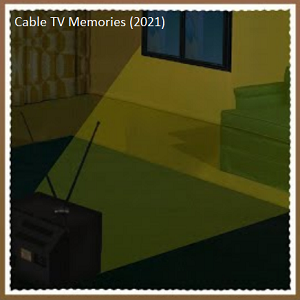
This is a staple of the Rollerwave genre, a fundamental building block. If Dan Frost’s “To Every Man” is the Eccojams of Rollerwave, then “Cable TV Memories,” lovingly crafted by enigmatic Milwaukee artist The Homecoming, is its Floral Shoppe- an album which defines the genre extremely well. If you’ve ever wondered what straight Rollerwave sounds like, this is it.
These are the sounds of a world so distant it is barely recognizable as our own. In fact, all signs point to it not being our own. This is a parallel universe of disposable smooth jazz, the kind of music that without a good deal of reverb and other effects is instantly forgettable, yet within the hands of a master craftsman like The Homecoming becomes something more, a delightfully twisted mutation. This is postmodern elevator music, always with a sinister hint behind it, a paratext to decipher. Trumpets and acoustic guitar whisk the listener into a television-induced coma from which there is no recovery.
The Homecoming has been compared, time and again, to The Caretaker, seeing as “Cable TV Memories” came out post-Everywhere At The End Of Time. I think this comparison is missing the point, though. While both albums are ambient, and both utilize the remixing of contemporary music to create otherworldly effects, I’ve found that The Homecoming’s usage of 1970s samples is particularly otherworldly, and what with the 1970s being more recent than the subject material of EATEOT, I think Cable TV Memories ironically creates a greater distance between the modern and the retrospective.
The commercials The Homecoming intersperses throughout the album, too, serve to create subtle hints of alienation. far from benign, these are strategically placed to give the listener a sense of growing dread and unease. A storm warning that demands the viewer continue normal activities despite the looming threat. An ad which, in a sublime coincidence, advertises a false impression of the 1950s as a flawless, halcyon utopia, in the same way modern genres like vaporwave advertise the 1980s. An ad which literally tells the listener that Chuck Mangione is going to make them feel good, reinforcing the idea that music is a paralyzing drug designed to distract us from the problems of the modern world, and that, whether we want to or not, we’re sinking deep into the couch cushions while the TV continues playing.
The samples within the album are altered just enough such that they’re rendered dreamlike and surreal, though not enough to rob them of their lifeless corporatism. As the title of the album suggests, it deals narratively with the introduction of networks like HBO for the first time into regions like Chicago and New York- a historical event of the 1970s which would later give rise to the modern cable infrastructure we all use today.
Despite its detached, ironic existence, the album creates a sense of relatability between the monotony of flipping through TV channels late at night and finding nothing good to watch and the more modern experience of mindlessly scrolling through your Instagram or Twitter feeds and finding nothing of real significance. All entertainment is the same, when you get right down to it, an anesthetic to dull the mind and remove pain, and music is no different. This is a painfully honest realization, and The Homecoming achieves what few other participants in the Rollerwave sphere have been able to achieve- a legitimate deconstruction of the 1970s as an era through the balance of sampling and effect. For that reason, I highly recommend this album, it’s an underrated gem and far, far more people should be aware of it. It will change you.